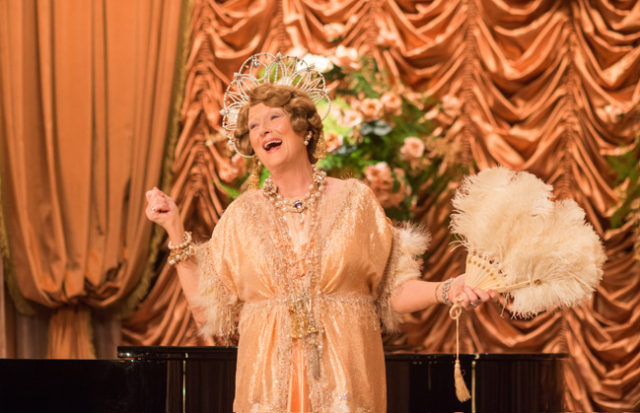In 1940’s New York, Florence Foster Jenkins was a prominent and very significant bold character on the Arts scene. An eccentric socialite who was a beacon that attracted a following and one that was convinced she had the voice of an angel…
In fact, this couldn’t be further from the truth; Florence Foster Jenkins (Meryl Streep) tells the story of this colourful yet delusional woman towards the end of her life. Obsessed with the idea she can achieve her lifelong dream of becoming an Opera Singer, the voice she hears in her head is one that soothes the soul but to everyone around her, it’s hilarious and ear-bleedingly awful. Her English Actor Husband St. Clair Bayfield (Hugh Grant), who just also happens to be her manager, humours her and does anything; he can to protect her from the haters.
After a trip to Carnegie Hall to hear renowned soprano Lily Pons perform, Jenkins becomes inspired to take to the stage and sing again, hiring pianist Cosme McMoon, played with a shy campness by The Big Bang Theory’s Simon Helberg. When money is no object nothing can stand in the way of achieving your dream no matter how lacking in real talent you really are.
We are first introduced to Florence in a mist of a lavish gathering for the New York Elite, all of which have a tremendous amount of respect for one another, but yet we do not hear Florence sing. Instead, we are given a glimpse into the world of Florence and equally important that of her husband. Who at the end of the night leaves for his own apartment where he lives with his mistress. Stephen Fears teases us with his script building up our characters before he truly let’s rip the extent of Florence’s singing talent. This delight comes when innocent Cosme auditions for Florence to become her pianist. It’s Helberg’s range of facial expressions – from disbelief to total panic – which begins the hilarity that starts to unfold.
As Florence sets her sights on performing at Carnegie Hall Bayfield and McMoon face one of their toughest challenges to keep Madame Florence’s world from collapsing around her when they can’t control who the audience will be. It’s the heartwarming relationship this trio have that makes Florence Foster Jenkins such joy to watch. Hugh Grant possibly gives one of his best performances in years. Surprisingly, he gives us a little dance sequence which should be cringeworthy but he quite simply makes it work.
Frears not only delivers the laughs but has some real emotional and poignant moments splattered throughout but these are never lingered on too long. Streep as ever plays both the emotional and triumphantly optimistic sides to Florence with flawless grace, can this woman ever do any wrong? She simply nails this woman’s character firmly into her soul and being.
Florence Foster Jenkins is out in UK Cinemas 6th May

